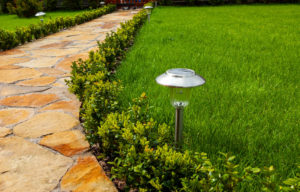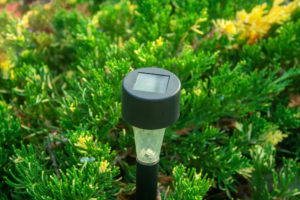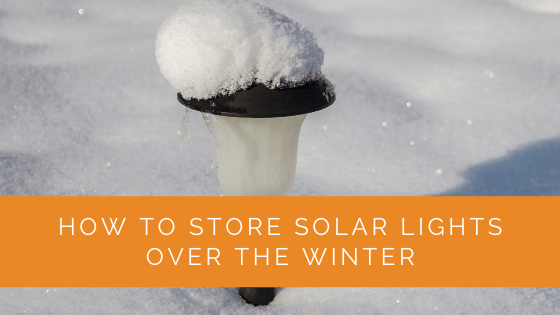Solar-powered lights are cost-effective, practical solutions to do your part for the environment without guilt and hefty electricity bills. However, the efficiency of solar lights highly depends on the weather conditions.
Although solar lights can collect and store sunlight even on cloudy days, their efficiency drops significantly. Knowing why and how you should store these outdoor solar lights in cold weather is essential.
Check out this detailed article on how to store solar lights in winter weather.
Contents
Key Takeaways
- Solar lights’ efficiency is significantly affected by winter weather conditions, including reduced sunlight and frost accumulation, making storing them in colder months essential.
- Extreme cold can harm solar lights’ battery life and performance, particularly if they don’t receive sufficient direct sunlight.
- Properly storing solar lights involves turning them off, protecting sensitive parts, storing them in a dry place, removing batteries, occasionally exposing them to sunlight, and considering indoor storage for decorative solar lights.
Why Store Your Solar Lights
Solar lights’ efficiency depends on direct sunlight. These lights don’t last their best hours during grey days as their charging ability gets significantly affected with no sun in the sky.
Dust, debris, water, and frost accumulation significantly affect efficiency and potential damage. This is all the more so in locations with freezing temperatures. On top of the decreased efficiency, frost accumulates and penetrates the sensitive part of solar lights.
Hence, storing solar lights is imperative in cold temperatures, even if they are designed with IP technology.
Should All Solar Lights Be Stored During Winter?
You can leave solar lights outside all year round, but a few things need to be considered before you do so.
The Weather Conditions
 Extreme cold can significantly affect solar lights’ battery life and half lifespan. Winters and extreme weather conditions stress the solar panel and solar light battery. This might affect the performance of the lights when needed.
Extreme cold can significantly affect solar lights’ battery life and half lifespan. Winters and extreme weather conditions stress the solar panel and solar light battery. This might affect the performance of the lights when needed.
Using solar lights with no direct sunlight will affect these solar products’ power generation capacity. Solar lights depend on direct sunlight for functioning.
If the direct sunlight received is less than 2 hours a day, the solar panel won’t gather enough power for proper functioning. It’s also possible for the solar panel to not have enough energy to power the light for even a few minutes.
IP Rating Of the Solar Lighting Device
Most solar lights are anti-corrosive and have at least an IPX4 rating, even the cheapest ones in the market. However, the sealing of the solar lights deteriorates over time.
This results in water penetration, causing short circuits and damaging the internals of the solar lighting, reducing its lifespan.
Therefore, storing solar lights in harsh weather conditions ( snow and freezing temperatures) is recommended. Hence, storing the solar lights in the winter is only sensible.
How to Store Solar Lights in Winters
Solar lights last long, don’t require electricity from the grid, and look classic! However, they don’t perform well during cloudy days and winter conditions. Therefore, it’s a must to store outdoor solar lights in winter.
Below are a few tips that you can refer to store your solar lighting in colder winter months!
Make Sure The Solar Light is OFF
Before you are off to shelf the solar lights to your winter storage cabin, make sure that these lights are switched OFF. Many solar lights come with an automatic activation feature. Due to this feature, many forget to switch the light OFF.
This might damage the rechargeable batteries and cause a deterioration of the integrated light sensor in the device. Hence, mindfully switch the solar lights OFF to avoid any possible damage.
Wrap The Lamp Heads Or Solar Panels
The head of the solar lights is the most sensitive and fragile part of these solar articles. The head of solar lamps is made of glass, where the solar panels are fixed. To avoid any possible damage to the solar panels, make sure to wrap them in either bubble wrap or packing paper.
You can also use spare blankets if you don’t have access to bubble wrap or packing paper. After wrapping them properly, place them carefully in a cardboard box. This will prevent the glass and solar panels from any possible damage while stored away.
Suitable Dry Places
Solar lights are made of metal and thus are always susceptible to corrosion and rust. Therefore, storing these lights in a dry and cool place is vital.
Hence, avoid storing solar lights in the basement, storage shack, or shed. Instead, if possible, store them in your garage or a well-insulated attic.
Remove Solar Lights From the Ground
 Solar lights function outdoors, particularly garden solar lights, placed in the ground to illuminate walkways and pathways. Although these garden solar lights work even in cold temperatures, storing them during winter is advisable.
Solar lights function outdoors, particularly garden solar lights, placed in the ground to illuminate walkways and pathways. Although these garden solar lights work even in cold temperatures, storing them during winter is advisable.
They can always be damaged beyond repair if hit by shovels, snowblowers, and other tools. This is especially true if they are covered in snow and are not visible, increasing the risk probability.
Remove the Battery
Most solar lights come with rechargeable batteries, which must be removed before storing. Failing to remove the batteries increases corrosion risks, damaging the solar lights.
Hence, it is advisable to remove them during winter and store them for the summer.
A Bit of Sunlight is a Must
Solar lights thrive on how much sunlight they receive, even if stored away. That’s right. You must take them out in a month at least once and expose them to some sunlight whenever possible. This will sustain their functioning capacity and prolong their lifespan.
It might sound like a bit of a hassle, but doing this trick will save you from any possible maintenance bills or damage in the future.
The Decorative Solar Powered Lights
Solar lights are usually durable and will probably do fine outdoors during winter. However, the same cannot be said for decorative solar-powered lights.
Decorative solar lights are fragile and highly susceptible to damage. These lights cannot withstand the harsh winter, ice, and snow conditions. Hence, if you have such decorative solar lighting, ensure they are stored inside.
Consider Using A Storage Unit
Solar lights do add a classic ambiance to their surroundings. Hence, if you have multiple solar lights to store, consider using a storage unit.
Using a storage unit will allow you to place them together. Furthermore, you’ll have to invest less maintenance effort when basking these dozens of lights in sunlight.
Our Expertise in Solar Lights
At Solar Panels Network USA, we’re here to provide you with valuable information and support regarding solar lighting. With our experience and understanding of the solar lighting industry, our team of experts is prepared to assist you in finding the right lighting solution for your needs. Whether you’re interested in improving your outdoor spaces, conserving energy, or adopting a more sustainable approach, we’re well-equipped to help. Please feel free to contact us with any questions or inquiries.
Endnotes
Solar lights last longer, are multi-functional, and provide good illumination at night. They are an excellent way to light up your garden or add a bit of charm to the surroundings. The solar panels attached to these lights use direct sunlight to store energy.
However, the efficiency of these lights drops during winter. With less sunlight in winter, these do not display their best performance and are more susceptible to potential damage.
Follow this guide on storing solar lights in winter, and you’ll be able to prevent any possible maintenance bills.
About the Author
Solar Panels Network USA stands at the forefront of solar energy solutions, driven by a team of seasoned solar engineers and energy consultants. With over decades of experience in delivering high-quality solar installations and maintenance, we are committed to promoting sustainable energy through customer-centric, tailored solutions. Our articles reflect this commitment, crafted collaboratively by experts to provide accurate, up-to-date insights into solar technology, ensuring our readers are well-informed and empowered in their solar energy decisions.

